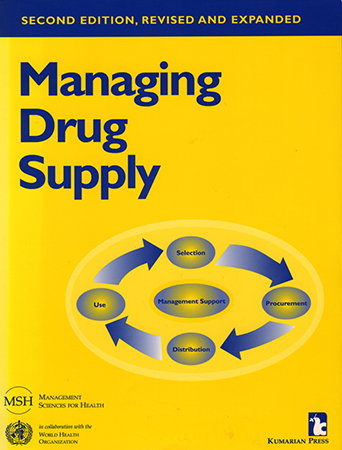
- 1997/816 pages
- A Kumarian Press Book
8 1/2" x 11" format, with illustrations
Managing Drug Supply:
The Selection, Procurement, Distribution, and Use of Pharmaceuticals, 2nd Edition
Management Sciences for Health, Inc.
Paperback: $95.00
ISBN: 978-1-56549-047-5
This edition of Managing Drug Supply provides a complete overview, as well as step-by-step approaches, on how to manage pharmaceutical systems effectively.
"Managing Drug Supply should be required reading for health officials and regulatory authorities as they embark upon developing or improving national drug use programs."—Jerome A. Halperin, US Pharmacopeia
"The new edition of this extremely valuable book is a quantum leap forward. I plan to use it as a text for a course in International Pharmacy that addresses elements of infrastructure essential to the selection, procurement, distribution, and use of pharmaceuticals in primary health care."—Hugh F. Kabat, American Association of Colleges of Pharmacy
"Provides a well-organized update on all issues relating to the supply and rational use of drugs in health systems of all kinds throughout the world. Well laid out and easy to use with extensive references."—Jon E. Rohde, UNICEF Representative, India
- INTRODUCTION.
- Toward Sustainable Supply and Rational Use of Drugs.
- Historical and Institutional Perspectives.
- Economics for Drug Management.
- Pharmaceutical Supply System Assessment.
- POLICY AND LEGAL FRAMEWORK.
- National Drug Policies.
- Drug Supply Strategies.
- Pharmaceutical Legislation and Regulation.
- Legal Aspects of Drug Management.
- Pharmaceutical Production Policy.
- DRUG MANAGEMENT CYCLE.
- Managing Drug Selection.
- Treatment Guidelines and Formulary Manuals.
- Essential Medical Supplies and Equipment.
- Managing Procurement.
- Quantifying Drug Requirements.
- Inventory Management.
- Managing the Tender Process.
- Contracting for Drugs and Services.
- Quality Assurance for Drug Procurement.
- Small-Scale Local Production.
- Drug Donation. Managing Distribution.
- Importation and Port Clearing.
- Medical Stores Management.
- Drug Management for Health Facilities.
- Planning and Building Storage Facilities.
- Transport Management. Kit System Management.
- Managing for Rational Drug Use.
- Investigating Drug Use.
- Drug and Therapeutics Information.
- Promoting Rational Prescribing.
- Ensuring Good Dispensing Practices.
- Encouraging Appropriate Drug Use by the Public and Patients.
- MANAGEMENT SUPPORT SYSTEMS.
- Managing Drug Programs.
- Planning for Drug Management.
- Monitoring and Evaluation.
- Community Participation.
- Hospital Drug Services.
- Management.
- Drug Financing Strategies.
- Analyzing and Controlling Drug Expenditures.
- Financial Planning and Management. Donor Financing.
- Revolving Drug Funds.
- Drug Management Information Systems.
- Computers in Drug Management.
- Personnel Management.
- Designing and Implementing Training Programs.







